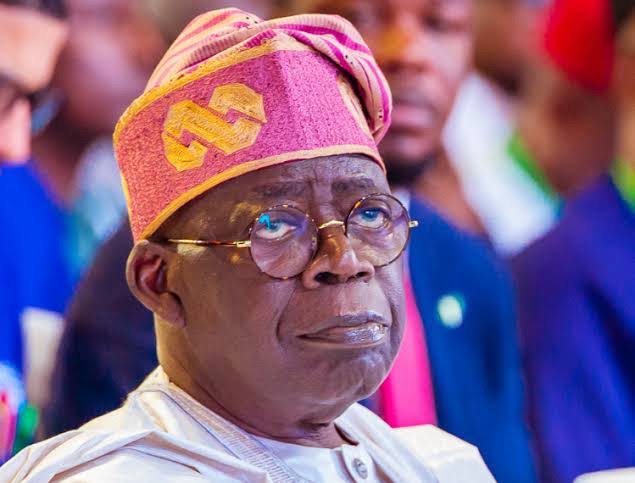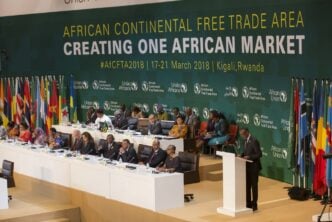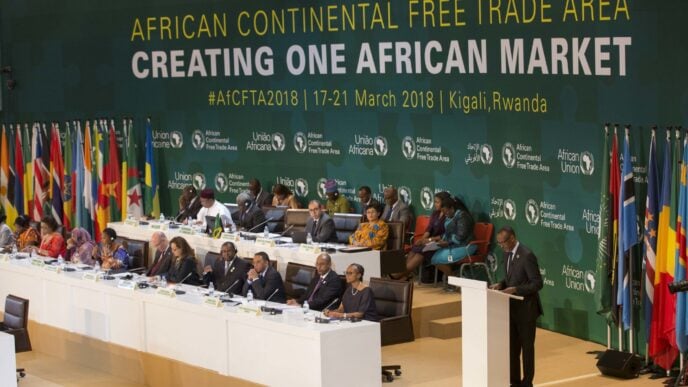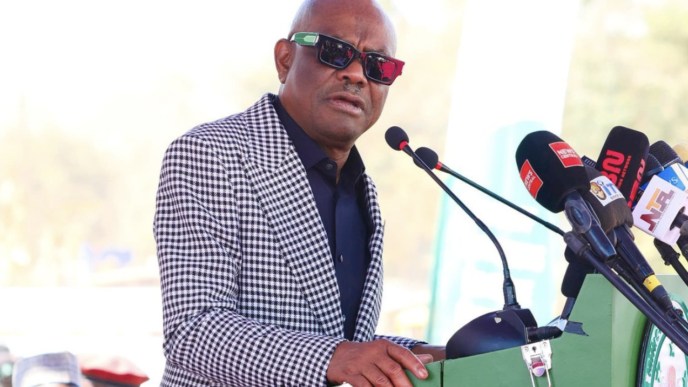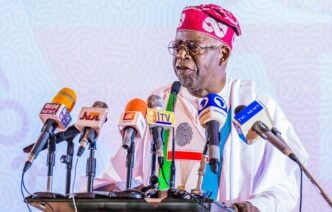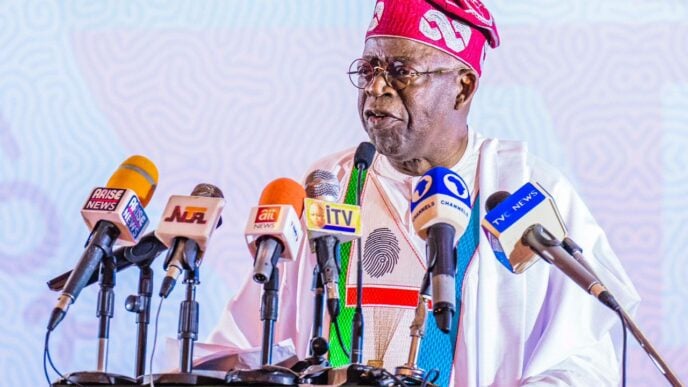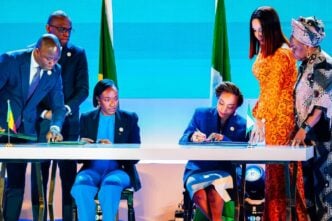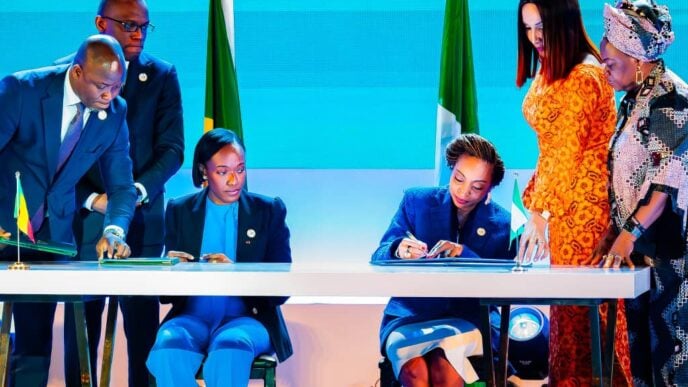Oh, oh, oh, when a woman, full of grace and unparalleled wisdom and one always trying to find the human in everything – not fickle to say her mind even though she doesn’t just talk, says to you, “Like Trump, like Tinubu”, then you have got to give that statement serious thoughts. Awake all night – not a wink of sleep the night I heard that phrase, and not knowing exactly what she meant since I didn’t get the opportunity to interrogate her much further, I began to ask myself what precisely these two consequential leaders have in common? That sparked a frantic attempt at closely looking at both leaders: their presidencies, mindsets, resoluteness and styles.
Interestingly, it isn’t hard to quickly draw a parallel between both leaders. With no signs of backing down, both of them, since their presidencies, have initiated the unthinkable and have stuck to their guns to push for certain reforms in an unprecedented and aggressive manner as they believe it is the right path to long-term economic recovery and stability for their nations.
They actualise most of the things their predecessors merely talked about – adept risk takers who transform into action what only remained as visions for presidents before them. You get a sense that for the leader of the free world and leader of the most populous African nation, not doing anything and allowing the status quo, which hasn’t worked for years remain unchanged is unacceptable and a demonstration of a cowardly attitude.
Tinubu, for instance, has pursued a slew of bullish policies than any before him – gaped them by a long stretch. For example, nothing prepared most Nigerians for the unlikeliest of ways Tinubu put his thumb on the scale and, without blinking an eyelid, yanked off the fuel subsidy during his inauguration on May 29 2023, which caught many off guard. Nevertheless, many experts believe this policy pronouncement could have been better implemented, while some others have warned that some of his policies are akin to IBB’s SFEM, with the potential of initiating the SAP-induced economic slump the country was forced into in the mid-80s. Moreover, a few others hold that this administration is implementing some of the exact policies that this president led demonstrations against during the Goodluck Jonathan regime.
Advertisement
You won’t be entirely wrong to say both of these men are not masquerading as pristine or spotless politicians who say the right things that the people are itching to hear, picking their words and eventually ending up with word salads. They just say their minds, and while this may anger a section of people, they come across as authentic to others and are viewed as not buying into the more-of-the-same syndrome as far as toeing the lines of their predecessors was concerned. Howbeit some of his lines haven’t fully landed with many folks regarding the bouquet of polices he has unleashed, it’s really hard to argue that President Tinubu is fast shaping the narratives on all fronts as far as governance is concerned, taking some historic steps that many in their wildest imagination wouldn’t think possible.
For instance, the signing into law by Tinubu of that historic piece of legislation; the Tax Reforms, is a testament to his not-business-as-usual disposition that would radically overhaul the country’s tax ecosystem and usher in a new dawn for the country for years to come. To a greater degree, spinning some of these policy steps requires a president with guts, given the peculiarity of our sociocultural ecosystem, which is predicated on regional influences, politics and biases.
You have two leaders in their seventies who, by every account, can be described as disruptors. While we cannot assume that the citizens of both countries are inflexible, slow or aversed to changes, their leadership styles have completely broken away from their predecessors, offering the people a totally different shade of governance – a type of governance a reasonable percentage of the citizens wish they never had to experience and endure, anyway!
Advertisement
Both have kicked in a wave of disruptions which happen to challenge conventional and established practices, which have not only drawn fierce resistance from members of their own parties but have endured grave backlash from the opposition and their supporters. One very critical fact their presidential styles have proven so far is that disrupting a customary and entrenched system comes with a heavy price. It appears, nonetheless, that in all of these, their nationalistic mindsets are not in doubt and are increasingly redefining the socio-economic and political narratives of both countries in spite of the cultural and institutional hostility that the Trump policies, for example, have faced not just domestically in the US but around the world.
It may be argued that Tinubu’s approach is far from being nationalistic, with the way many citizens have been thrown further into impoverishment since he assumed office due to his grinding policies. Beyond doubt, many Nigerians are wringing their hands, expressing deep distress and pleading for help, but thus far, it has eluded them.
However, it was practically impossible with the systemic failures at worrying levels and the uncharted territory the country found herself in to remain economically viable without the implementation of some of those policies that have come to be characterised as extremely daring and breathtaking. The economic situation pre-Tinubu presidency was more or less going to achieve a double whammy: eventually impoverish the nation and also deepen the poverty status of Nigerians in the short to long term. It is a situation that should be rightly described as a national security threat.
There’s an adage in Yoruba, “Tita, riro lan kola. Toba jina tan, lon doge.” Meaning – the process of designing tribal marks is usually painful, but becomes fashionable once the wounds heal. Tinubu’s policies, like those of Trump, though widely unpopular in some quarters, are examples of the hard choices a strong leader would have to make at times to improve the socioeconomic conditions of his/her country and put the country on a path of sustainability and growth that would endure far into the future.
Advertisement
It is not a hyperbole that Tinubu has dramatically changed the socioeconomic-political terrain of this country – it is what it is. Nevertheless, many Nigerians have expressed concerns and cast shadows over the efforts of this government to make any impactful progress in arresting the myriads of social problems the country is grappling with and are hoping this government will up its ante significantly and demonstrate its seriousness in handling the waste, fraud and abuse that Nigerians can see are abundantly flourishing in our polity. Unlike Tinubu, Trump seems to be showing the world that the issue of fighting corruption and reining it in is a high-priority item on his agenda. His efforts have shown that, after all, America, even as a superpower, isn’t immune to deep-seated corruption and is taking decisive and concrete steps through DOGE to handle it.
Tinubu, on the other hand, hasn’t proved to Nigerians that he has a zero tolerance to this menace and it appears so far that he hasn’t got the spine to decisively move against this dreaded mountain – corruption, which has been so chaotic in our polity and is at the centre of our social problems, ripped us apart and put our economic growth on impasse for decades. So far, there’s a broad daylight between the rhetoric of Tinubu at different fora to combat corruption definitively and the actions of his government. For many folks, it’s still all talk and not much work, as this administration’s playbook doesn’t seem to illustrate that it wants to flip the narrative on those who see corruption as the norm. Nigerians hope for the rejuvenation of the activities at an incredibly fast pace of public institutions like the EFCC, ICPC, etc, to match the respect and ‘fear’ these institutions got from the public during the Obasanjo administration.
Painfully, we have a country where a handful seems to be continuing a tradition of holding the nation to ransom – very few ‘privileged’ individuals who scapegoat other well-meaning Nigerians while working wildly to cover up all their cover ups – a deeply complex web of deception which has left the nation’s socioeconomic status a shattered wreck. These persons appear to be competing in the race to outdo one another as far as corruption is concerned, with ordinary and struggling Nigerians, who literally are surviving on hands-me-downs, face fierce pushbacks, are demonised and seemed as if they’re beating a dead horse when they question the rot in the system and how their collective wealth is flushed down the drain by a few individuals. The message these vulnerable Nigerians get from all these is clear and unmistakable: cut off smoothly from their collective patrimony and potentially rendering them as economic ghosts in their father’s land, with their hopes of being spared the worst dashed.
I will conclude with an event that brought tears to the eyes of so many people. The 1992 Olympics in Barcelona, where a certain British athlete, Derek Redmond, who suddenly developed a serious injury right in the middle of the competition, tore his hamstring in the semi-finals of the 400 meters! This young man saw all his competitors leave in the dust. Hopped and cried due to the injury and while all others went through the finish line, his father – loving and compassionate, busted out from the crowds, defying protocols, to help his son – his beloved son, to the finish line – to the applause and standing ovation of everyone in the stadium and the admiration of the entire world.
Advertisement
That incident, for many people, was the hallmark and defining moment of that competition. Asked later, Derek said, “If you go back to that race in Barcelona, I finished last, but I finished. If you ask most people who won the Olympic final, most people won’t know. If you ask who was the bloke that got up and finished the race? Lots of people remember that. Somebody asked me, what’s your definition of success? I said, to me, getting up one more time than you’ve been knocked down even if you’ve been knocked down 70 billion times.”
I would like to draw inspiration from this story to create a unique connection to our nation, Nigeria, which, like Derek Redmond, has sustained devastating injuries from corruption and poor governance and has been severely and relentlessly knocked down economically, politically and socially for decades. This has led a host of nations who secured independence from Britain right about the same time as Nigeria like Malaysia, Singapore and Kuwait or those that did well after Nigeria like Qatar and UAE, or the UAE which discovered commercial oil the same year Nigeria did at Oloibiri in 1956, spun past us and evolved into economic and social powerhouses.
Advertisement
While a smattering of Nigerians who experience hunger and poverty on the heels of another are earnestly hoping for a game-changing situation, the burning question is: will President Tinubu, like Derek’s father, refuse to be handicapped by the ‘systemic protocols’ that seemed to have held so many presidents before him down, to press down the road to retool the system, unleash the full potential of this country and get the ravaged and injured Nigerian state up once and for all from the economic woods she has been plunged for far too long over the line? It remains to be seen if this administration will turn around the stale smoke of corruption and bad governance, and the belief of some Nigerians: ‘can anything good come out of Nigeria?’
Ande, a financial and political economy analyst, writes from Lagos and can be reached via [email protected]
Advertisement
Views expressed by contributors are strictly personal and not of TheCable.

